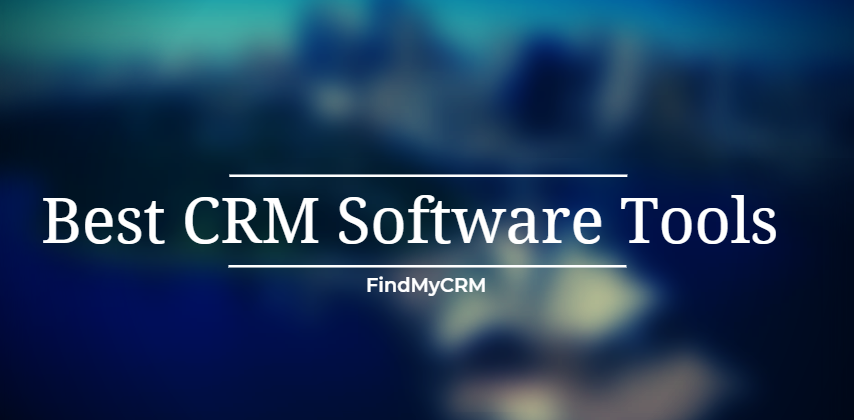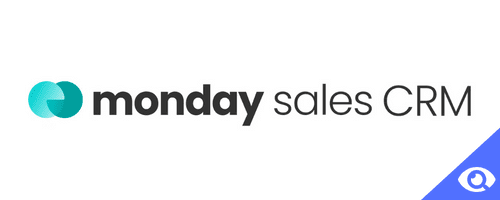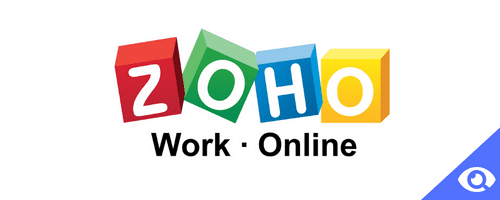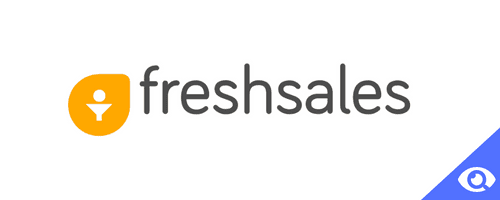CRM software: What is it?
CRM (customer relationship management) software is an online application that helps businesses manage a sales pipeline from lead generation to closing sales.
To increase sales, CRMs help enterprises access, organize, and make sense of customer data.
CRM gathers data from a variety of sources, including social media, email marketing, live chat, phone conversations, personal interactions, feedback forms, and more. It also makes use of data analytics to analyze the buying habits, trends, and needs of the customer.
| The goal is to improve customer engagement and experience by converting leads into customers, and then maintaining and growing that relationship. |
Customer relationship management systems have been available for a while (first in paper form), but their advantages only became clear after widespread digitization.
Sales, marketing, HR, customer service, IT, business intelligence (BI), and finance departments are all connected through CRM systems. Additionally, data is instantly available to every employee, enabling teams to make quick, data-driven choices.
In general, CRM solutions have been successful in breaking down organizational silos, bringing together interdepartmental teams, and boosting sales.
The Pros of Implementing CRM Systems
Navigating the complexities of a growing business can be overwhelming—more growth means more invoices, billing, and communication. How can you stay on top of it all? Enter the game-changing benefits of utilizing top CRM companies.
Here's how it works to your advantage
- Stay Organized: Manage the moving parts of your expanding business with seamless organization.
- Automate Workflows: Streamline business processes by automating workflows, saving time and effort.
- Boost Sales Performance: Elevate your sales game with tools that enhance performance and efficiency.
- Minimize Errors: Say goodbye to human errors as the CRM system adds a layer of precision to your operations.
When it comes to CRM systems, the true champion is the one that not only manages your business growth but also alleviates the day-to-day stresses that come with it.
Compare Our Top Options for the best CRM software
Look at this table and find out what is the best CRM system for your needs.
| CRM |
Best for |
Pricing |
Trials |
| Best CRM software for sales teams |
$25 - $1,250 per user per month |
14-30 days |
|
| Best Free CRM with Marketing Tools |
$40 - $3,200 per month |
14 days |
|
| Best sales automation center |
$0-$84,99 per user per month |
|
|
| Best CRM platform for pipeline management |
$14.90 - $99 per user per month |
30 days |
|
| Best CRM software for custom workflows |
$0-$16 per user per month |
14 days |
|
| Best CRM software for SMBs and managing customers |
$14-$52 per user per month |
15 days |
|
| Best CRM For Smart Work |
$30-$45 per user per month |
14 days |
|
| Insightly |
Best CRM software for analytics and reports |
$29-$99 per user per month |
14 days |
| Best CRM Software with AI lead scoring |
$0-$69 per user per month |
21 days |
|
| SugarCRM |
Best CRM software for customer service |
$49-$85 per user per month |
7 days |
| Apptivo |
Best CRM Software for workflow automation |
$8-$20 per user per month |
30 days |
[Related Article: CRM Selection]
TOP 10 CRM Software in 2024
1. Salesforce
Best CRM software for sales teams
Try Starter Suite for free
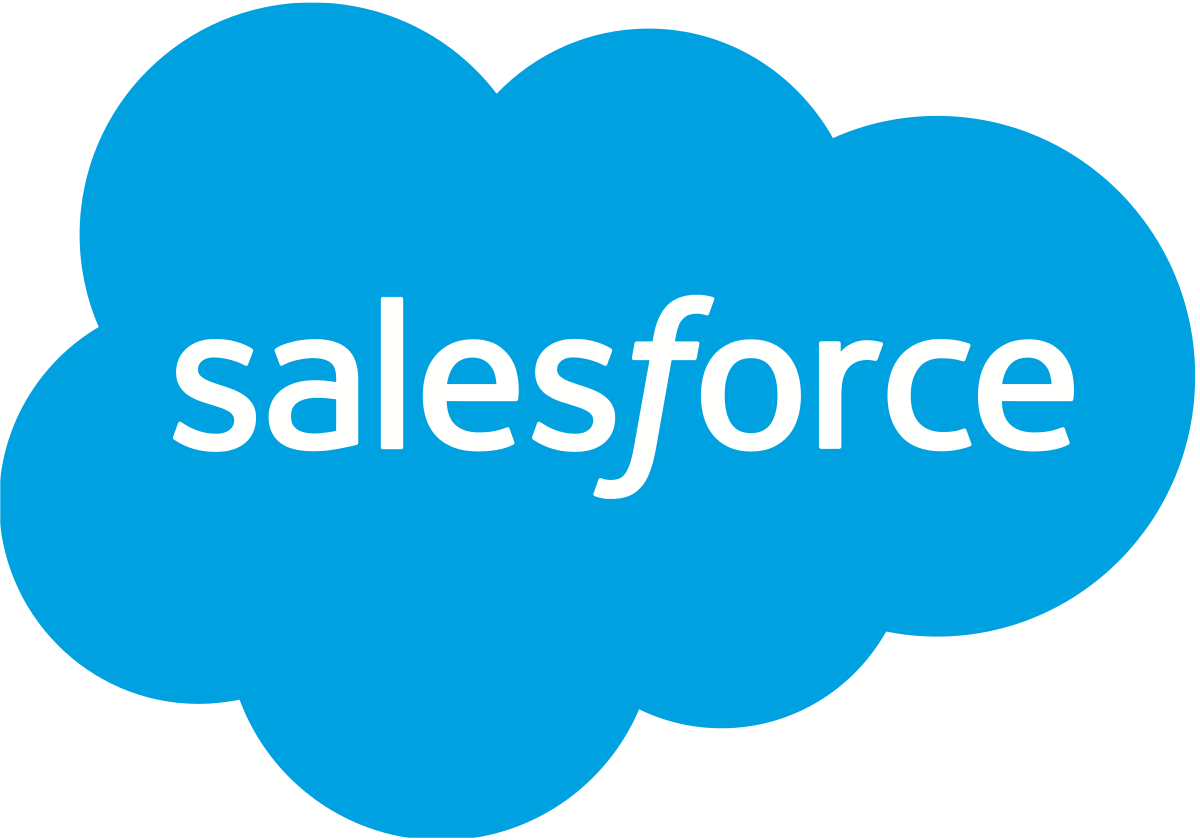
4.5
Salesforce is one of the most well-known brands on this list it has more than a million users worldwide. This cloud-based CRM software supports all company divisions, including sales, service, marketing, analytics, and more.
Prime features:
- Opportunity Management - By using the "opportunity management module," you can find the ideal possibilities and close more deals.
- Contact management - This module lets you keep track of the information including client communications, histories, and social media mentions.
- Sales Performance Management - Set sales targets and goals and manage your sales performance to obtain the highest results.
- Visual Workflow – Using this tool, you can drag and drop, distribute, and track files and updates
- First Feed Feature - You can view the content you wish to see first
Pros:
|
|
Cons:
|
|
Pricing plans:
The costs may differ because Salesforce has a wide range of products. The most expensive subscription plan is $1,250 per user per month; the subscription options start at $25 per user per month (both billed annually). To receive a personalized plan, you can also contact them.
Source: Salesforce
2. HubSpot
Best Free CRM with Marketing Tools
Grow better with HubSpot
4.9
An essential component of the HubSpot ecosystem is HubSpot CRM (Customer Relationship Management).
Due to its top CRM tools and time-saving features, HubSpot CRM is perfect for sales professionals. The ability to gather, monitor, and generate new leads within a database makes it a great choice for marketing teams as well.
They provide a fully functional version of their software that is available for free, with the option to upgrade and have access to their complete set of marketing tools.
Prime features:
- Email and Lead Nurturing - You can send free, customized emails and monitor your outcomes with inbuilt analytics reporting.
- Contact Management and Organization - By linking your email account to their CRM, you can automatically sync and organize all of your contacts in one place.
- More than 300 Integrations - Easily link your current tech stack to unlock more features from the technologies you already pay for.
- Live chat and chatbots - Provide quicker customer help through instant chat, productivity tools, and support tickets.
- Sales Pipeline Data - Sales leaders can monitor their complete sales funnel and gain insights into individual performance and sales activities.
Pros:
|
|
Cons:
|
|
Pricing plans:
HubSpot CRM provides a free plan that starts with a ton of the most popular CRM tools. After that, you can decide whether to upgrade to one of their paying plans:
- Starter ($40 per month): Additional forms, up to 50 email list segmentations, $1k in ad management, 10 reporting dashboards, and limited conversational bots are all included in the paid plan in addition to all the free features.
- Professional ($800 per month): Includes all the features of free and starter, plus 2,000 email list segmentations, $10k in ad management, 25 reporting dashboards, and full chatbot functionality. This package also unlocks other features including phone support, content strategies, an SSL certificate, and a blog.
- Enterprise ($3,200 per month): All the features listed above (with more advanced options), plus user roles, event-based segmentation, lead scoring that predicts sales, API calls, multi-touch revenue attribution, webhooks, and so on.
Source: HubSpot
3. EngageBay
Best sales automation center
Market better. Sell faster. Support smarter
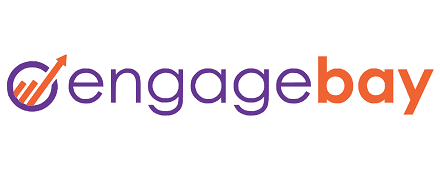
EngageBay is a complete sales, marketing, and service automation solution with free CRM functionality. EngageBay can be used both to attract target audiences and customers and to help turn them into long-term satisfied customers. The EngageBay software can be divided into three logical areas: marketing, service, and sales.
Prime features:
|
|
Pros:
|
|
Cons:
|
|
Pricing plans:
Pipedrive offers four paid plans:
- Free
- Basic
- Growth
- Pro
These packages are priced between $0 and $84,99 per user per month.
Source: Engagebay
4. Pipedrive
Best CRM platform for pipeline management.
The CRM platform to grow your business
Pipedrive is a CRM system that helps to increase sales and revenue. The purpose of the name is to invoke the sales funnel and boost sales statistics.
Prime features:
- Lead management: Track sales and leads from forms, chatbots, and other sources around the clock.
- Visual Sales Pipelines - You can set up specific stages (hot, warm, and cold) for each rep or team member to organize your pipeline.
- Communication Tracking - You can set your schedule in real-time and have access to a complete contact history that records calls, emails, chats, and more.
- Mobile Apps - To increase sales, you can use Pipedrive from your smartphone and connect it with other sales apps.
Pros:
|
|
Cons:
|
|
Pricing plans:
Pipedrive offers the following plans:
- Essential
- Advanced
- Professional
- Power
- Enterprise
Source: Pipedrive
5. monday sales CRM
Most popular CRM systems for custom workflows.
You can customize your workflows on monday sales CRM to keep track of every step of the sales cycle, from lead generation to post-sale support.
monday sales CRM is your best option if you want to customize anything that has to do with your sales pipeline, process, or customer data.
With this CRM system, you can easily get a complete picture of your clients and sales data. It's a great option for businesses who wish to actively track their sales process.
The Monday.com dashboard also makes it simple to see everything at a glance and identify any possible bottlenecks or problems in your sales cycle.
Prime features:
- Have everything set up in front of you so you can detect any potential issues with your sales cycle.
- Simple customization for tracking every step of the sales process
- Perfect for businesses that wish to keep a tight eye on their sales funnel and performance
- You can access this top CRM system with its mobile app while on the go.
- Integrate Monday.com with other tools and applications you use.
Pros:
- This platform allows you to do anything from gathering user input to visualizing it in a chart so that you can make data-driven decisions.
- Real-time collaboration with team members makes it simple to complete work quickly.
- Extremely helpful in managing and scheduling tasks.
Cons:
- Monday Work Docs' search features are not as strong as some of the competing products.
- Workflow creation is more difficult than it should be with so much freedom.
Pricing plans:
You can check out all of Monday.com's features during a free 14-day trial to see if they suit your business.
The following paid plans are available (for a team of at least three people):
- Individual: $0 free forever
- Basic: $8 per user each month
- Standard: $10 per user each month
- Pro: $16 per user each month
- Enterprise: Get in touch with them for a custom plan
6. Zoho CRM
Best CRM system for SMBs and managing customers.
Using Zoho CRM, you can track key sales and marketing opportunities and boost conversion rates while getting a 360-degree view of your company. One of the most well-liked applications on this list, Zoho CRM has more than 150,000 users worldwide.
Prime features:
- Advanced CRM Analytics - Integrates your data and provides insights you can act on.
- Zoho's AI-Powered Sales Assistant - Sales teams and representatives can make decisions based on client profiles and notice anomalies.
- Performance management - You can get the most out of your business investments with tools like gamification, reporting, sales forecasting, and territory management.
- Sales Enablement - You can create price quotes and access sales scripts.
- Process management - With the help of a sales builder and processing rules, the team is able to map out each step of the sales process.
Pros:
- Support for customers across all channels, including social media, live chat, email, and phone.
- Offers high-level automation.
- Extremely flexible
- More than 100 integrations with third parties, including LinkedIn, Zapier, and email services like Google and Outlook.
- Very scalable
- Free trial period of 15 days.
- Provides a mobile version (for paid plans).
- Guarantees data integrity, security, and regulatory compliance.
- Multi-language provided.
- Offers outstanding calendar management.
- Provides data export and import.
- The predictive sales feature can help with email sentiment analysis, data enrichment, and other tasks.
Cons:
- Only the top tiers include AI.
- Limited custom fields
- No third-party integrations available on the free plan of this advanced software
Pricing plans:
Zoho CRM offers four paid plans:
- Standard - $14 per user per month
- Professional - $23 per user per month
- Enterprise - $40 per user per month
- Ultimate - $52 per user per month
7. Act!
Best CRM on the market For Smart Work.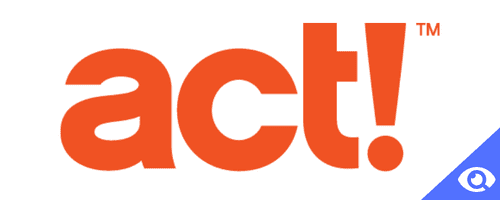
Act! gives businesses the analytics and insights they need to close more deals and manage their client relationships effectively.
In addition to managing contacts and leads, opportunities, quotations and payments, marketing automation, and reporting, it also provides a wide range of other features. Businesses can select the software that best meets their requirements by choosing between on-premise and cloud-based versions.
Prime features:
- Rich account management - Gives companies access to all the customer information they require.
- Calendar and activity tracking - Businesses can view upcoming events and follow their progress.
- Dynamic sales pipeline management - Provides a visual picture where businesses can monitor where each deal is in their sales pipeline.
- Insight analytics - Gives companies useful information about their customer base so they can choose more effective marketing and sales strategies.
- Office, Outlook, and Google integration - Businesses can access their Act! account from any device.
- The Act! Companion mobile app - Businesses can view their account, contacts, and calendar even on the go.
Pros:
- Manage sales force automation to make it easier for you to monitor the effectiveness and progress of your sales team.
- Offers strong marketing automation features that make it possible to design outstanding campaigns that are targeted to a wider audience.
- Customer relationship management features of this one of the best CRM applications make it simple to manage your client interactions and enhance the overall performance of your company.
Cons:
- Out-of-date UI is clunky enough to cause problems in many places
- Email integration requires an external email customer
- In certain places, data entry is too complicated.
Pricing plans:
The cost for the on-premises plan is $37.50 per user per month, billed annually.
Cloud-based services have payments of either $30 (Standard plan) or $45 per user per month (Expert plan).
8. Insightly
Best CRM software for analytics and reports.
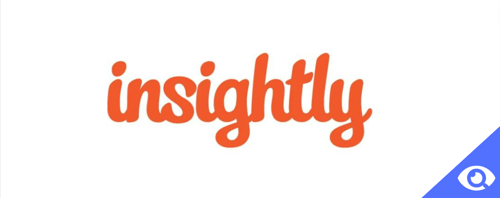
Insightly is cutting-edge CRM software that can help you expand your business more quickly by building lasting relationships with customers.
Prime features:
- Lead Routing - Tracks the most important lead information, including a detailed activity history of emails, phone calls, meetings, and marketing campaign sources.
- Relationship management - Gives you the ability to develop reliable relationships with existing customers and attract new ones.
- Multiple Third-Party Integrations - Compatible with a large number of programs, including Gmail, Mailchimp, Dropbox, Outlook, and others.
- Pipeline management - This enables you to keep keep track of the sales team's performance, monitor the sales pitch, and determine exactly where it is in the sales funnel.
Pros:
- Compatible with both Android and iOS mobile devices.
- Offers visual dashboards for showing and monitoring key metrics.
- Highly flexible and scalable
- Provides tools that make effective filtering and tagging possible.
- Built-in automated email tracking and reminders.
- Free 14-day trial.
- One of the least expensive software options.
- Customer service is accessible through phone, tickets, and email.
- Built-in instructions for getting practical experience with the program.
- Gives a macro/micro view of your business in real-time.
- Easy to use and straightforward.
Cons:
- Does not support live chat and is only available for on-premise use.
- Supports just one language (English).
Pricing plans:
The costs per person each month range from $29 to $99 (billed annually). Additionally, Insightly provides a free plan for up to 2 users.
9. Freshworks
Best CRM Tool with AI lead scoring.
Freshworks CRM is an AI-based CRM for lead scoring, email activity, email capture, and other functions. A 360-degree view of your company is one of its main advantages.
Prime features:
- Lead management - Offers ways to turn potential leads into clients.
- Deal Management - Provides you with a complete picture of the deal's status in the sales funnel. Additionally, it maximizes your chances of conversion by helping you manage each stage of the funnel.
- Tracking and Lead Scoring - With an AI tool, you can score and rank leads to determine which ones are most likely to become customers.
- Auto Lead Assignment - The CRM enables carefully chosen leads to automatically choose salespeople.
- Smartforms (web-to-lead) — When a website visitor fulfills the online form, they are immediately converted to leads and added to your database.
Pros:
- Offers advanced automation and intelligent workflows.
- Wide variety of integrations, including MailChimp, Zapier, Calendar, Piesync, Segment, and more.
- RESTful APIs can be used to read, change, add, and delete help desk data.
- Lead segmentation based on behavior.
- A sophisticated lead scoring system based on traits and behavior.
- Sends out custom welcome and voicemail messages.
- GDPR-compliant.
- Free trial period of 21 days.
- Excellent phone and email customer support.
- One of the top CRMs with a mobile application.
- Event tracking (tracks previous communication to plan the future strategy).
- Extremely flexible.
Cons:
- Some additional features, such as salary slips, income tax proof submissions, would be useful.
- Sometimes loading times are too long.
- More frequently than with some other CRMs, configuration updates may be necessary.
Pricing plans:
The four plans offered by Freshworks CRM range in price from $0 to $69 per user each month (when billed annually).
10. Sugar CRM
Top rated CRM software for customer service.
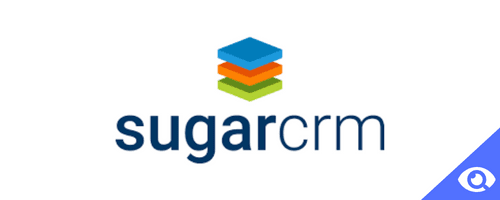
Sugar CRM is a platform that combines marketing, sales, and customer support. This CRM software is hosted on-premise. It is possible to edit each module, portal, and report. That means that you can maximize every benefit from your CRM with some effort.
Prime features:
- Campaign Management: Provides support across several channels and streamlines all aspects of marketing campaigns.
- Lead management: Data insights indicate the profitability of a channel and make it possible to monitor the performance of a campaign.
- Reports and Dashboards: View real-time, customizable data to assess crucial KPIs for a variety of metrics, including leads, opportunities, and sales rep performance. Additionally provides information on sales trends, client profiles created using various parameters, and case reports.
- Sales Forecasting: Models include likely, best-case, and worst-case scenarios.
- SugarBPM: Provides a visual interface for developing workflows, tools for improving troubleshooting, and dashboards for saving screenshots of tasks and workflows.
- Case Management: Customer service representatives can manage customer cases accurately and efficiently by monitoring all cases for each account and getting reminders for quick responses.
- Bug tracking: Agents have access to information about bugs, including their frequency and the status of their resolution.
- Project Management: Gantt charts, task management, and dashboards are among the standard project management features that are included to manage projects like campaigns and customer cases without requiring a third-party tool.
- Integrations: Popular Google programs including Docs, Drive, and Gmail. Social media platforms allow businesses to interact with customers more successfully.
- Mobile App: Provides a mobile app for tablets and smartphones that includes filters, dynamic search, GPS mapping, click-to-text, click-to-call, and offline synchronization.
Pros:
- Extensive feature set
- Data analysis with AI
- Helpful Dashlet reports
- Well-connected with marketing platforms and help desk platforms
- Outstanding developer tools for customization
Cons:
- Complex enough for beginners
- Unattractive list-based UI
- Quite costly, especially at higher-paid plans
Pricing plans:
Each of SugarCRM's tools is sold separately. The price of Sugar Sell and Sugar Service is $80. The cost of the Sugar Market is $1,000.
11. Apptivo CRM
Most popular CRM software for workflow automation.
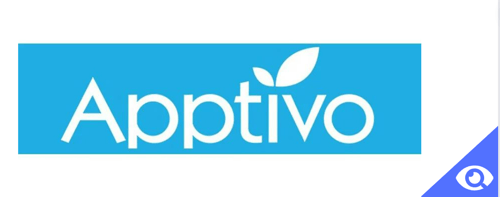
Apptivo is a cloud-based SaaS with a lot of features. It is a flexible customer relationship management system for companies of all sizes.
Prime features:
- Contact management - Using lead capture from emails or web forms, Apptivo enables you to both manage your contacts and add new ones. This app can be customized in a wide range of ways to organize your contact list according to your preferred information.
- Campaign management - Apptivo is excellent for marketing campaigns and makes it simple for you to quickly generate attractive advertisements. Campaigns can be built with templates and themes that provide great visuals. Additionally, target lists help you identify the best audience for campaigns.
- Lead management - Lead scoring by Apptivo provides information on the likelihood that a lead will become a deal and move into the sales pipeline.
- Opportunities and deals - Emails can be used to gather information and develop fresh opportunities. Sales force automation, which follows leads through the sales pipeline and automatically performs actions like follow-ups, helps streamline opportunities.
- Invoicing - There are several apps on Apptivo that fall under the invoicing category. These include ledgers, credit notes, estimate calculators, expense reports, tools for managing licenses and insurance, property management, sales receipts, and more.
- Knowledge databases - Users can create databases for information, how-tos, and other FAQ-related content with the Apptivo Answers app.
- API and integrations - It includes G Suite and Office 365, especially Outlook, as some of the most important and well-liked integrations.
- Mobile apps - Both the Google Play store for Android devices and the Apple App Store for iOS, iPhones and iPads offer customized mobile Apptivo apps. You can manage your contacts, finances, tasks, projects, and even customer service via mobile apps, all from a straightforward but intuitive user interface.
Pros:
- User-friendly with many resources to help you onboard and learn the software.
- Apps that fall under-invoicing
- Free version available
- It breaks the platform down into individual apps which you can get alone or in bundles
Cons:
- Less popular with large corporations and enterprise-level businesses.
- Poor customer support in the free plan
Pricing plans:
Apptivo premium pricing per user starts at $8. Moreover, Apptivo offers a free version.
Top 3 Free All-in-one CRM Software List
1. Capsule
Capsule is the most popular CRM software that effortlessly combines charm and functionality. Among other CRM systems, Capsule stands out with its blend of simplicity, functionality, and captivating interface, making it an appealing choice for users seeking a streamlined and effective CRM solution.
Prime features:
- Capsule boasts a design that prioritizes seamless user interaction, ensuring an intuitive experience.
- The dashboard is strategically created to revolve around tasks, placing priorities at the forefront.
- Capsule excels in project management functionality, resembling a true project management platform. It offers calendar, Kanban, and list views, along with a dashboard highlighting daily tasks and upcoming activities.
Pros:
- Capsule's interface is not just visually appealing but also functionally exceptional, providing an enjoyable user experience.
- Despite limitations, Capsule compensates by offering insightful metrics that enhance the overall user experience.
Cons:
- Compared to some competitors, Capsule may not offer an extensive array of features.
Pricing plans:
- Capsule offers a free version for up to 2 users
- Starter: £14 per user per month, billed annually
- Growth: £27 per user per month, billed annually
- Advanced: £42 per user per month, billed annually
- Ultimate: £60 per user per month, billed annually
2. Vtiger
Vtiger, a dynamic CRM solution, distinguishes itself with an orderly mega menu and an extensive array of robust features. In essence, Vtiger emerges as a compelling CRM solution, blending organizational efficiency with feature richness, making it a noteworthy choice for diverse CRM needs.
Prime Features:
- Vtiger's mega menu stands out for its exceptional organization, streamlining user navigation.
- Vtiger impresses with a comprehensive set of robust features, encompassing diverse aspects of CRM.
- The platform adopts a focused UI, utilizing a hamburger icon to access a variety of features, including CRM, marketing, sales, service help desk, and inventory tracking.
- Vtiger simplifies reporting with 18 pre-made reports and a user-friendly wizard for custom report creation.
Pros:
- Tailored for small businesses, Vtiger's free plan accommodates 10 users, 3,000 contacts, and 1,000 monthly email sends.
- Transitioning to a paid plan is seamless, with costs varying based on user privileges. Departmental alignment allows for strategic cost savings.
- Vtiger provides a thorough onboarding checklist of 32 tasks, offering users a comprehensive understanding of its capabilities.
- Helpful videos pop up when exploring new screens, providing continuous support for users.
Cons:
- The mobile applications for Vtiger present challenges in terms of user-friendliness.
Pricing plans:
- Free plan
- ONE GROWTH:
- Standard: $12 per user per month, billed annually
- ONE PROFESSIONAL:
- Standard: $30 per user per month, billed annually
- Single App: $20 per user per month, billed annually
- ONE ENTERPRISE:
- Standard: $42 per user per month, billed annually
- Single App: $30 per user per month, billed annually
3. Snov.io
For businesses in their initial stages or venturing into new markets, Snov.io proves indispensable by offering an integrated solution for prospecting, best CRM management software, and email communication, with a particular focus on outreach strategies. The platform's straightforward approach, coupled with valuable features, positions it as a valuable asset in the business development toolkit.
Prime Features:
- Snov.io provides an extensive database of company information, facilitating in-depth research.
- The inclusion of Chrome extensions enhances prospecting efficiency, particularly for users engaged in daily LinkedIn activities.
- Snov.io enables users to send direct emails to contacts, offering a choice between numerous email templates or the option to create custom ones.
- Users can set up drip campaigns using a visual editor, incorporating customizable rules for email frequency, wait times, and conditional triggers based on recipient actions.
Pros:
- Snov.io combines CRM functionality with prospecting tools, allowing users to search for companies, access employee rosters, verify email validity, and more.
- A Chrome extension enables the seamless addition of LinkedIn search results or individual profiles to prospecting lists.
- The free plan includes a basic email warm-up feature, optimizing emails to land in inboxes rather than spam or promotions.
Cons:
- Snov.io exhibits a strong emphasis on the outreach use case, potentially limiting its appeal for users seeking a broader range of CRM functionalities.
Pricing plans:
- Free plan
- Starter: $30 per month, billed annually.
- Pro: starts at $75 per month, billed annually.
- Managed Service: starts at $3999 per month, billed annually.
Top 3 Paid All-in-one CRM Software List
1. Oracle NetSuite
The next option among top-tier CRM systems is Oracle's NetSuite CRM, an excellent choice among other top CRM platforms tailored for wholesalers. This powerful tool automates fundamental manual tasks and provides real-time insights into both operational and sales performance.
However, it's crucial to note that NetSuite is more of an ERP solution than a dedicated CRM, a factor worth considering as you explore this software.
Prime features:
- Efficient management of quotes, commissions, sales forecasting, and partner relationships.
- Robust automation features for marketing and sales processes.
- Comprehensive customer service management capabilities.
- Stay connected on the go with its mobile app.
- Access reporting and analytics options for informed decision-making.
- Seamless integration with various third-party applications, including Google apps, mail, and calendars.
Pros:
- Highly customizable to align with your specific needs.
- Provides a 360-degree view of customer data, including contact info and history.
- Offers tight integration with multiple accounting software.
- Allows automation of repetitive tasks and bulk record editing.
Cons:
- Presents a steep learning curve, making it complex and less user-friendly.
- Reliability concerns with company support for bug and crash reports.
- Setting up third-party integrations can be challenging without specialized support.
- Help resources are inconsistent and incomplete.
- Costs can escalate rapidly.
Pricing plans:
NetSuite's pricing details are not explicitly outlined on their website. The system operates on an annual license fee, coupled with a one-time implementation fee for initial setup. The license cost is influenced by three key factors: the core platform, optional modules, and the number of users on the account. NetSuite provides a personalized quote based on this information.
2. Method:CRM
Method:CRM stands out as the premier choice for QuickBooks and Xero users seeking a CRM system that goes beyond the ordinary. It offers a fully adaptable experience, enhancing both efficiency and productivity.
With Method:CRM, you can effortlessly monitor leads, and its seamless two-way synchronization with QuickBooks and Xero ensures that once leads evolve into customers, there's no redundant entry in your database.
Moreover, it boasts advanced automation capabilities that rival even the most sophisticated sales and marketing automation platforms.
Prime features:
- Streamline your business workflows through intuitive drag-and-drop automation.
- Experience instant synchronization of estimates, invoices, and payments with QuickBooks or Xero.
- Provide your customers with online portals for self-service at their convenience.
- Capture leads effortlessly through automated web-to-lead forms.
- Enjoy robust contact management, featuring a comprehensive 360-degree view of contact details and history.
- Stay connected on the move with the mobile app.
Pros:
- Robust, two-way QuickBooks and Xero integrations that pack a punch.
- Tailor the solution limitlessly to cater to your unique needs.
- Reuse report, transaction, and email templates for added efficiency.
- Leverage advanced automation features to elevate sales performance.
- Effortlessly convert estimates into invoices.
- Extensive third-party integrations, including Google apps, Zapier, and Outlook.
Cons:
- Currently, the platform is available exclusively in English.
- Limited accessibility, catering specifically to QuickBooks and Xero users.
Pricing plans:
- Contact Management: $25 per user per month, billed annually.
- CRM Pro: $44 per user per month, billed annually.
- CRM Enterprise: $74 per user per month, billed annually.
3. Keap
Introducing Keap, our next top-notch system in this CRM systems list, specifically tailored for small businesses. Positioned as a versatile and dependable solution, Keap serves as a comprehensive toolkit with essential yet robust CRM features.
Prime features:
- Generate custom reports tailored to your business's unique needs.
- Implement triggers that automate marketing workflows based on client actions.
- Deliver personalized follow-ups to promising leads.
- Enjoy seamless third-party integrations with Google apps, Outlook, Zapier, and more.
- Witness real-time contact updates as you input new actions and client information.
- Leverage sales management and marketing workflow automation features.
- Achieve customer segmentation through tags, categorizing contacts based on types and actions.
- Enable automatic payment collection through popular apps like PayPal, WePay, or Stripe.
Pros:
- Abundant instructional resources for user support.
- Built-in email templates and robust email tracking capabilities.
- Reliable customer service, featuring live chat and premium consulting.
- Efficient customer segmentation tools for targeted engagement.
- Strong automation features, particularly for long-term lead nurturing.
- SMS messaging available for U.S. customers.
Cons:
- Prospect nurturing and auto-marketing tools can be challenging to navigate.
- The contact-centric approach may pose difficulties in managing business-to-business relationships.
- Steep learning curve, potentially time-consuming for users.
- Advanced search capabilities are lacking.
- Absence of autosave functionality.
- Appointment setting feature is inflexible.
Pricing plans:
- Pro: $159 for 2 users per month
- Max: $229 for 3 users per month
- Ultimate: $279 for 3 users per month
3 Best CRM for Planning and Tracking Tasks
1. Quickbase
For individuals seeking a straightforward and user-friendly software solution that effortlessly caters to their basic daily needs, Quickbase emerges as an excellent option. With a focus on simplicity and practicality, this one of the best CRM platforms provides a platform that is quick to comprehend and easy to navigate.
Prime Features:
- Quickbase provides comprehensive visibility into all client information, encompassing customer activity and interactions.
- The platform offers the capability to automate various business workflows, streamlining processes.
- Quickbase boasts a customizable interface that doesn't require coding skills, allowing users to tailor it to their specific needs.
- Users can easily configure sales pipelines and integrate them with third-party applications.
Pros:
- Quickbase is known for its quick and easy-to-understand nature, making it accessible to users at all levels.
- The platform operates on a centralized cloud database, ensuring accessibility and collaboration.
- Quickbase is backed by good customer support, complemented by an extended trial period.
- The process of data entry and updates is straightforward and user-friendly.
- Users can customize the platform to their needs without delving into complex coding.
- Quickbase enhances sales performance through the configuration of sales pipelines.
Cons:
- The default interface might be considered plain, potentially lacking the visual appeal of some other CRM software.
- Some users have reported encountering bugs, indicating potential issues with the platform's stability.
- Quickbase may lack some of the advanced features found in many other CRM software solutions.
- The platform imposes a minimum requirement of 20 paid users per account, which may be excessive for smaller teams or businesses.
Pricing plans:
- Team: Starts at $35 per user per month, billed annually
- Business: Starts at $55 per user per month, billed annually
- Enterprise: Contact the vendor
2. ClickUp
ClickUp is a dynamic project management platform crafted to cater to the diverse needs of businesses. This software ampng other CRM software tools is not just a tool; it's a complete solution that effortlessly streamlines task management, client communication, and goal tracking.
Prime Features:
- ClickUp serves as a centralized hub, empowering teams to efficiently manage assignments, deadlines, and real-time progress.
- Revolutionize team communication with built-in chat and commenting features, ensuring crystal-clear collaboration on tasks and projects.
- Empower teams to synchronize their efforts with organizational objectives by setting and tracking goals within a unified platform, fostering a cohesive approach to success.
- Enhance project efficiency with intuitive time-tracking tools, allowing teams to monitor and analyze time spent on tasks and projects for heightened productivity.
- Customize ClickUp to meet specific business needs through personalized views, fields, and workflow configurations, providing unparalleled flexibility in project management.
Pros:
- ClickUp doesn't just offer a free plan; it provides a robust solution with unlimited tasks and CRM records, a cost-effective boon for teams managing client projects or sales processes.
- Elevate project and sales management with customizable workspace boards, enabling teams to tailor processes to their unique requirements.
- ClickUp's cost scalability ensures that businesses, regardless of size, can find a suitable plan, making it an affordable choice for teams with diverse requirements.
Cons:
- ClickUp, while robust, lacks extensive proposal management tools, potentially requiring users to explore supplementary solutions for this specific aspect of their workflow.
- Navigating ClickUp might pose challenges due to its multitude of software modules and tools.
- While covering basic email outreach and planning, ClickUp's marketing features are limited.
Pricing plans:
- Free plan
- Unlimited: $7 per member per month, billed annually
- Business: $12 per member per month, billed annually
- Enterprise: contact the vendor
3. Trello
Trello stands out as a revolutionary task-tracking platform that redefines the way teams manage projects and collaborate. Renowned for its simplicity and user-friendly interface, Trello transforms complex tasks into visually intuitive boards, making it an ideal solution for teams of all sizes.
Prime Features:
- Trello's hallmark feature is its visual boards, which provide a clear and organized overview of tasks, progress, and project status.
- Tasks are represented as cards, allowing users to categorize and organize them within customizable lists, facilitating easy prioritization.
- Trello fosters collaboration through shared workspaces, enabling team members to contribute, comment, and update task status in real-time.
- Users can create detailed checklists within cards and set due dates, ensuring accountability and timely task completion.
- Trello supports file attachments and integrates seamlessly with various third-party applications, enhancing flexibility and connectivity.
Pros:
- Trello's intuitive design makes it easy for users to adopt and navigate, promoting quick onboarding and seamless task management.
- With customizable boards, lists, and cards, Trello adapts to diverse project management needs, offering flexibility for different work processes.
- Trello excels in real-time collaboration, allowing team members to stay updated on project developments and contribute effortlessly.
- Trello is accessible across multiple platforms, including desktop and mobile devices, ensuring teams can stay connected regardless of their location.
Cons:
- While ideal for simpler tasks and projects, Trello may be less suitable for managing highly complex or intricate project workflows.
- Trello lacks robust features for tracking task dependencies, which can be a limitation for projects with intricate interdependencies.
- The platform provides basic reporting capabilities, but users seeking in-depth analytics may find Trello's features somewhat limited.
Pricing plans:
- Free plan
- STANDARD: $5 per user per month, billed annually
- PREMIUM: $10 per user per month, billed annually
- ENTERPRISE: $17.50 per user per month, billed annually
3 Best CRM for Enhancing Customer Service
1. Zendesk
Imagine a tool that sees customer relationships as its top priority – that's Zendesk.
For small businesses in the USA, Zendesk boasts the most extensive array of features among help desk software. However, as numerous reviews highlight, this robust functionality comes at a cost, both in terms of expenses and usability. Zendesk caters to various communication channels, including live chat, social media, phone call centers, SMS, and mobile apps compatible with Android and iOS.
Prime Features:
- A versatile platform supporting multiple channels: email, ticket forms, live chat, voice, SMS, social media, self-service, and community forums.
- Shared inbox equipped with collaboration tools such as macros, internal notes, collision detection, custom views, ticket assignments, and light agents.
- Rules-based automation and triggers for streamlined workflows.
- Incorporation of artificial intelligence tools for enhanced efficiency.
- Reporting dashboards for insightful analytics.
- A knowledge base to empower users with comprehensive information.
- Over 1,000 pre-built integrations and apps for seamless connectivity.
Pros:
- Unparalleled flexibility in the user interface, adapting to diverse needs.
- Robust reporting and query tools for in-depth insights.
- Boasts a vast market of integrations and apps for extended functionality.
Cons:
- Entry-level plans come at a premium cost.
- Customizing pre-built dashboards is restricted to the Enterprise level, limiting dashboard personalization for users on lower-tier plans.
Pricing plans:
- Suite Team: $55 per user per month, billed annually.
- Suite Growth: $89 per user per month, billed annually.
- Suite Professional: $115 per user per month, billed annually.
- Suite Enterprise: contact the vendor.
2. HelpDesk
HelpDesk is a robust ticketing system that goes beyond the ordinary to provide stellar email support. This platform not only excels in conventional features but also surprises users with unique functionalities like its screen recording function, enabling the creation of screen capture videos to enhance client replies.
Prime Features:
- Email and contact form support (additional channels accessible via integrations).
- Automation for streamlined workflows.
- Personalization options for tailored customer interactions.
- Shared inbox equipped with collaboration tools.
- Reporting dashboards and analytics for performance insights.
- Integrations with other LiveChat products and various external tools.
Pros:
- User-friendly design and easy navigation.
- Excellent user experience (UX).
- Centralized repository for support requests, simplifying retrieval and management.
Cons:
- Limited feature set compared to some competitors.
- Possibility of emails getting flagged as spam.
- Challenges in locating older tickets at times.
Pricing plans:
- Team: $29 per user per month, billed annually.
- Enterprise: contact the vendor.
3. Jira Service Desk
Within the comprehensive Jira Service Management Suite lies a specialized help desk module called Jira Service Desk, meticulously crafted for IT teams. This top CRM software extends its capabilities beyond traditional help desks, incorporating IT service management (ITSM) and robust asset management functionalities for tracking hardware and software.
Prime Features:
- Designed to be user-friendly, facilitating ease of navigation.
- Customizable automation rules for optimizing workflows.
- Foster real-time collaboration among team members.
- Dedicated service desk functionalities and organized request queues.
- Empower users with self-service capabilities.
- Establish and maintain service level agreements for efficient service delivery.
- Addressing IT service support needs with precision.
- Collect and analyze customer satisfaction metrics.
- Comprehensive reporting tools for project insights.
- Integration with Slack and Microsoft Teams for streamlined communication.
Pros:
- A free plan is available for a maximum of three agents.
- Expanded integration options for messaging channels.
- Intelligent forms can be created with minimal or no coding.
Cons:
- Access through social media channels necessitates a third-party add-on.
- Integration with different authentication services requires an additional subscription.
Pricing plans:
- Free plan
- Standard: $22.05 per agent (estimated) $66.15 monthly total
- Premium: $49.35 per agent (estimated) $148.05 monthly total
- Enterprise: contact the vendor
How to choose a CRM system
1. Plan your budget
It's wise to set your budget before you start shopping because CRM prices can range from free to more than $1,000 each month. Before looking into feature sets and service plans, it is simpler to select one of the top CRM products that suits your pricing range.
2. Create a feature list
Even the most basic CRM system might be too complex because of the huge variety of features and capabilities. List the CRM components that are essential and those that are desirable but not necessary to ensure clarity.
This is a wonderful opportunity to get feedback from other employees who will use the top CRM vendors in your company. They can eliminate features you believed they would require or suggest ones you hadn't considered.
3. Get recommendations from similar businesses
It can be difficult to choose the best option among the best CRM programs in a market that is crowded with sales technology. Recommendations from experts who know the requirements of your industry are valuable.
4. Evaluate the present market
High-profile systems you've heard of in the past might not be the best option today because the CRM market is changing quickly as technology advances. Small business advice websites and trade publications are the greatest places to learn what's now in style—and what isn't.
5. Analyze reviews
Take the time to read any user reviews you come across as your choice of potential top CRM systems grows. Reading about actual solutions on the websites of the vendors won't provide you as much insight into how they work in practice.
6. Check your top picks
Take each of these candidates for a test drive so you can determine which CRM software has the most potential at this moment. Before investing money in a long-term solution, test as many of the companies' free trials as possible.
The easiest way to evaluate the best choice among other top CRM solutions is to use it yourself. Sales representatives are typically ready to answer any questions you have or give you a demo of their product, but keep in mind that it's their job to put it in the best light.
7. Come to a decision
It's time to decide once you've done your research. Even though it could take some time to complete all of these processes, the effort is worth considering the significance of the investment.
When choosing a CRM for the education industry, consider factors like the specific needs and goals of the institution, features like student recruitment and enrollment management, alumni relations management, fundraising, and donations management, reporting and analytics capabilities, ease of use, and customization, as well as pricing and integration options with existing systems to find a solution that fits the unique requirements and budget of the institution.
Which CRM has the best overall results? Key conclusions
When it comes to choosing the best CRM software for your company, HubSpot takes the top spot. Its extensive features, user-friendly interface, and robust tools make it a standout choice. However, it's important to note that Salesforce and Pipedrive are also serious competitors in the CRM market, offering their unique strengths.
While reading this article, we hope that at least one of these best CRM systems immediately resonated with you. Whether it's HubSpot, Salesforce, Pipedrive, or any other CRM provider mentioned, take the leap and start leveraging the power of CRM to streamline your sales, marketing, and customer service efforts. With the right CRM software, you'll be able to strengthen your customer relationships, boost productivity, and drive business growth. So don't hesitate, to choose the CRM solution that aligns with your company's needs and goals, and start reaping the benefits today.
[Related Article: What Is CRM Meaning?]
Frequently Asked Questions About CRM Systems
What tasks do CRM systems do?
CRM solutions help your sales team with communication tracking, lead management, and even marketing campaign building. In other words, a CRM enables you to build and maintain relationships with your clients and other companies.
CRM software is used by businesses for a variety of reasons. However, at first, the CRM industry was primarily targeted toward sales and PR professionals, providing a practical way to store data and monitor customer communications. CRM solutions today include a broad range of functions, including marketing, analytics, communication, and light project management. Some of the top CRM applications even include a built-in chatbot and calling features, enabling your sales representatives to speak with customers right from the platform.
What are some instances of CRM software?
Any technological tool that enables firms to manage communications with their current and potential customers is considered CRM software. Salesforce, Zoho, and HubSpot and others best CRM solutions are leaders in the CRM software industry.
What defines an "open source" CRM platform?
The term "open source" refers to software that makes some or all of its source code available for users to review and modify. Open-source programs are frequently chosen by developers and programmers who desire considerable customization features for their CRM software.
What differentiates marketing automation from ERP and CRM software?
It makes sense that there is frequently confusion about the distinction between ERP and CRM software given that the two have some overlap.
Accounting, human resources, inventory, and analytics are just a few of the many company processes that ERP software is designed to manage. As a result, ERP software frequently includes CRM functionality. CRM software specializes in keeping track of customer information, recording client interactions, and storing lead information that relates to sales. Meanwhile, businesses use marketing automation to streamline, automate, and measure marketing operations in order to increase revenue.
Do I need to consider a free CRM?
Using a free CRM has the obvious benefit of being cost-free. When it comes to the benefits that free CRM software may provide, systems like HubSpot move the needle by enhancing business operations and organization without any out-of-pocket costs.
The number of users, integrations, and possibilities for campaign design is often limited with free programs. They just give you the features you need to realize you may require more. In other words, you can use them as good starter programs while analyzing your particular needs and choosing one of the CRM management tools.
What additional tools integrate with CRM software?
The most popular CRM software integrations are for sales and marketing add-ons. Also widespread are tools for reporting and tracking. While third-party integrations need middleware to enable data exchange between the CRM, the operating system, and other apps, direct integrations often connect more quickly. Because the integration needs to be implemented, custom API integrations often take longer.
How do I encourage my staff to use CRM software?
It's crucial to explain to your employees what a CRM system can do for them. To identify a solution that works for everyone, involve your workers in the search process. Make sure your team receives all the necessary training before and during implementation so they are confident using the program. Encourage your staff to say their worries to the training representative to address them. Then your team members will feel confident and competent using your top rated CRM system.
What does a CRM analyst do?
To help your company in providing the best sales and customer service recommendations, a CRM analyst analyzes your consumer data. To find the most effective ways to market to your customers, these specialists can help you understand their requirements and interests.
What are the drawbacks of CRM software?
Using CRM software comes with various challenges, just like any other business strategy. First and foremost, small business owners may not be able to buy such technologies. Many CRM services include hidden costs in addition to being expensive upfront. For instance, in addition to the base price of the CRM, you could also have to pay for system administrators, software developers, maintenance, and data backups. Before choosing whether you can afford a certain system, read the fine print and speak with the CRM vendor about any additional costs.
What comes first in the CRM process?
Research is the first stage of the CRM process. Spend some time getting to know your target audience and the best way to reach out to them. You need to know their hobbies, preferred way of contact, demographics, and favorite communication channels.
Then, separate your target audience into categories so that you can directly market to them based on their preferences. The first stage in the CRM process is to collect and group your leads. This will help you better understand the marketing strategy you should make to turn them into clients.
How does automation usually work in CRM systems?
Within your CRM, you can automate three different types of workflows: marketing, sales, and service roles. CRM automation enables your software to do particular tasks frequently so an employee won't have to. This is especially helpful for moving customers from the knowledge-gathering stage of the buyer experience to the stage where they can be converted into a client. It also saves time and improves the workflow of your staff, which can increase the overall productivity of your business.
Is it difficult to learn CRM?
The greatest CRM programs are typically very simple to use. The majority of CRMs offer simple tools for importing your customers from other platforms. The best CRM sales software and other types have very visuals that may be easily customized using drag and drop. Sales pipelines and marketing automation both include attractive and easy interfaces.
What features characterize a strong CRM?
A CRM should look and feel straightforward and intuitive. Analytics dashboards shouldn't have an excessive amount of information clutter. A CRM platform is considerably simpler to learn and operate when it is clean and simple. This is crucial for keeping track of leads and avoiding missing any sales opportunities.
